Talk to a Registered Dietitian and use INSIDER20 for 20% off!
Talk to a real Dietitian for only $99: Schedule Now
This post contains links through which we may earn a small commission should you make a purchase from a brand. This in no way affects our ability to objectively critique the products and brands we review.
Evidence Based Research To fulfill our commitment to bringing our audience accurate and insightful content, our expert writers and medical reviewers rely on carefully curated research.
Read Our Editorial Policy
Make calories cheaper, the world said. It can only benefit humanity, the world said.
Well, we can’t blame our forebears for their desire to feed the masses, but alas, here we are recommending corn syrup substitutes in a world plagued by obesity, diabetes, and heart disease.
That’s quite enough gloom—no matter your starting point, you can always take steps to improve your health, and substituting corn syrup (regular or high-fructose) is an excellent one.
But what exactly makes a good corn syrup substitute, and why is this stuff to be avoided in the first place?
In this article, we’ll explore both of these issues while providing some practical ways to reduce your corn syrup consumption as much as possible.
It’s the fructose. Okay, next section.
Jokes aside, high-fructose corn syrup (we’ll get to regular corn syrup in a minute) seemed like an attractive option when it was first developed, but the sheen very quickly wore off as it started to reap its effects on the public.
Of course, unscrupulous food companies are still pumping high-fructose corn syrup into foods because it is so cheap, but the truth is that excess fructose corn syrup hits the liver in such a way that causes a cascade of health issues.
As this Cleveland Clinic article explains, fructose stimulates the liver to produce triglycerides and cholesterol, promoting non-alcoholic fatty liver disease and just about all the lifestyle-related causes of heart disease.
Excessive fructose can also cause leaky gut by eating through the lining that protects the intestines, in turn leading to likely weight gain and/or type 2 diabetes.
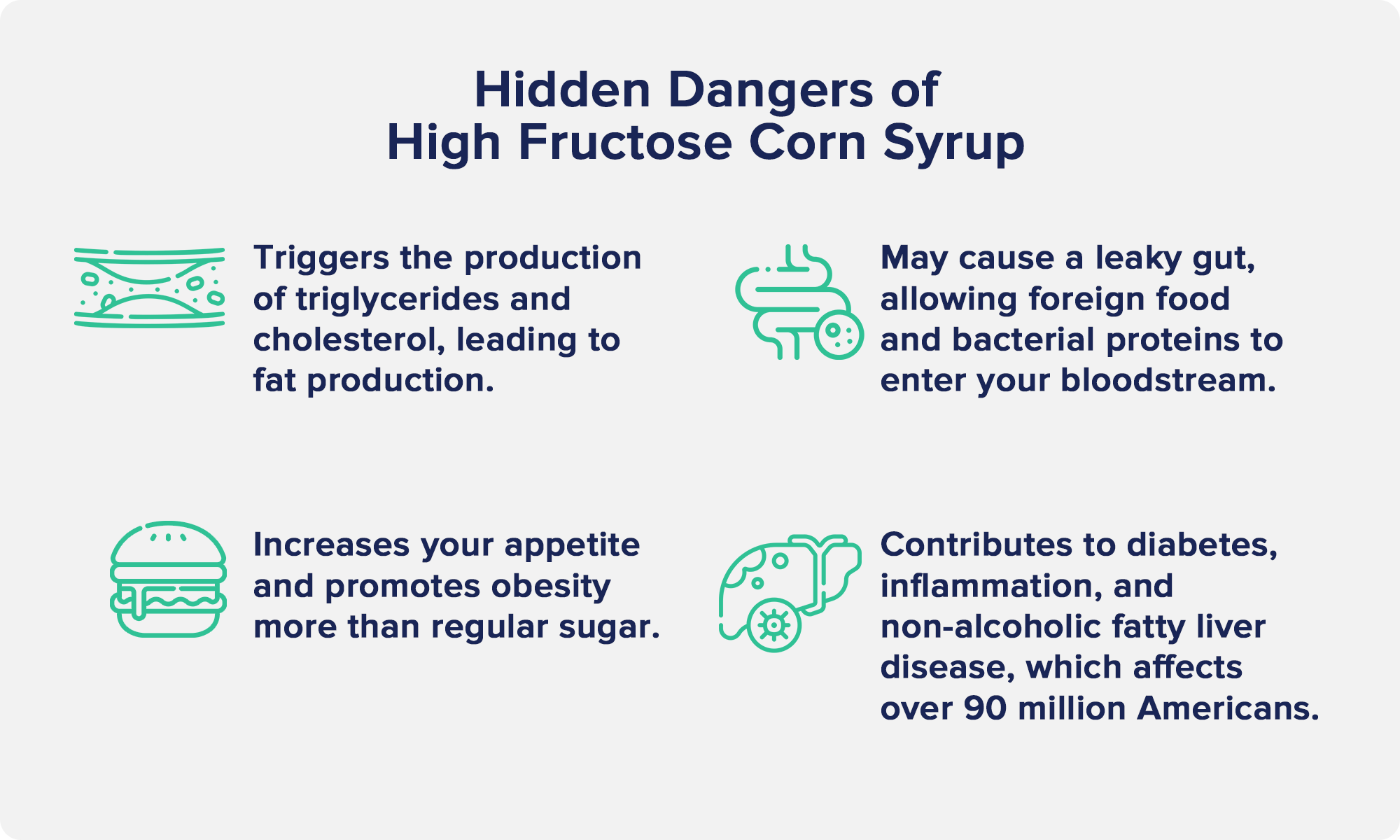
So, while all the heart-health-conscious people are on the lookout for processed red meat, saturated fat, etc., it’s actually this refined form of sugar that’s causing or worsening metabolic syndrome.
Oh, and high-fructose corn syrup increases appetite. And it promotes inflammation.
Alright, we get it—but regular ol’ corn syrup can’t be as bad, can it?
Pure corn syrup is 100% glucose. It is the sugar extracted from corn, boiled, and voila—you’ve got “liquid corn sugar.”
However, there’s no guarantee that the corn syrup at your local grocery store isn’t cut with fructose—a common occurrence—so check your labels.
As for the comparison, corn syrup is definitively less damaging than high-fructose corn syrup, but it is still a refined sweetener—loaded with empty calories—that is commonly used in unhealthy contexts.
Final verdict: While regular corn syrup is markedly healthier than high-fructose corn syrup, it’s not that much better. It’s on a similar playing field as pure cane sugar.
These factors considered, we used three major criteria when establishing this list of our favorite substitutes for corn syrup:
All three of these factors can contribute positively or negatively to the health implications. Using high-fructose corn syrup as an example of what not to put in your body, we can see this in action.
On to the list.
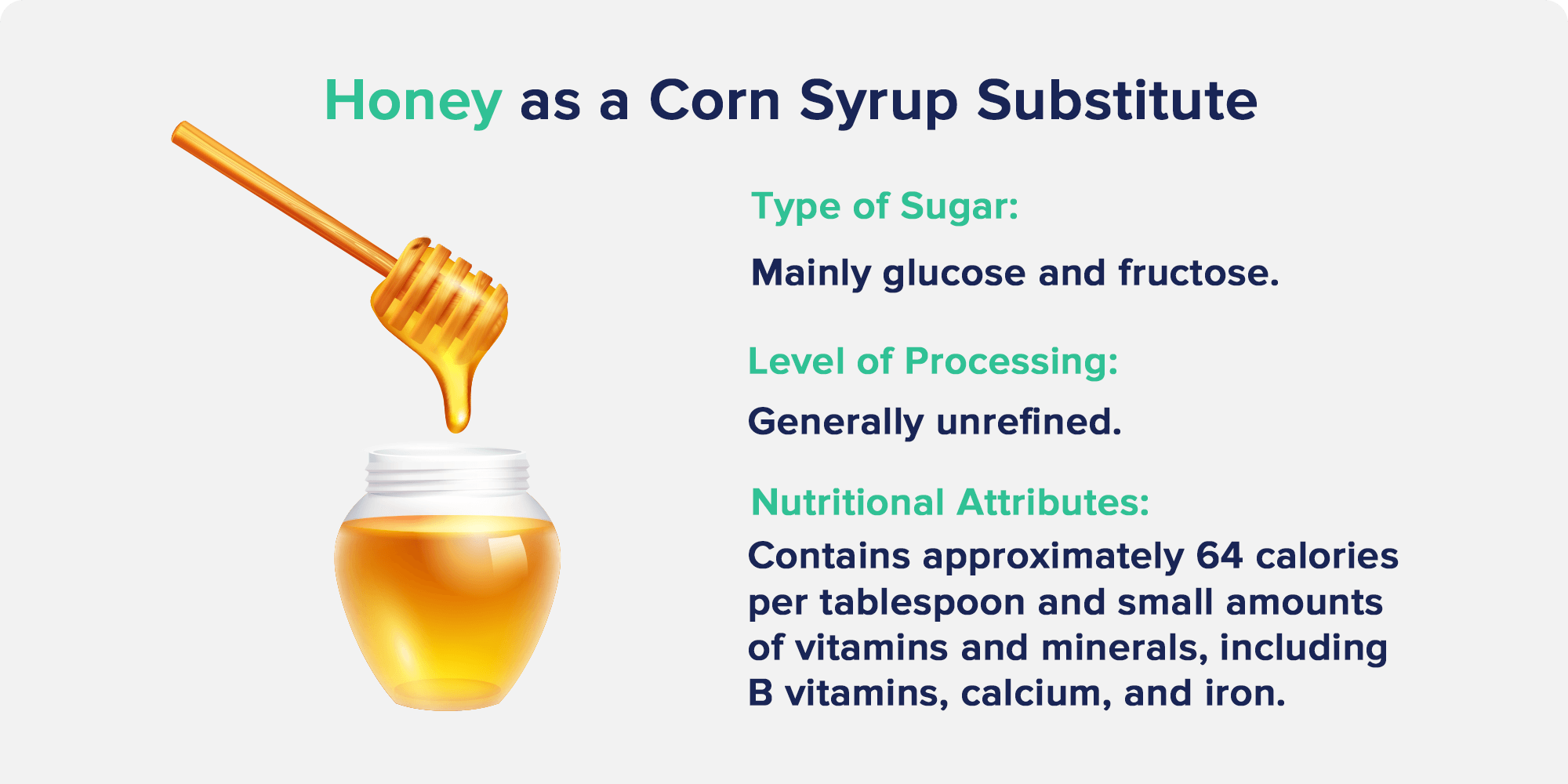
Before any bakers turn up their well-trained noses at us, we appreciate that honey can’t always stand in for corn syrup because it can crystallize, and has a different taste/texture.
However, when you can swap it in for corn syrup, you have the advantage of a more nutritionally dense, lightly processed (usually) option.
The copper and riboflavin from one tablespoon of honey barely makes it over the 1% mark for daily value—big whoop—but the antioxidants and polyphenols are what we’re really focusing on. Many of these polyphenol compounds have been associated with antimicrobial and anti-inflammatory properties.
Some sources even go as far as to suggest that honey can have “Protective effects for the treatment of various disease conditions such as diabetes mellitus, respiratory, gastrointestinal, cardiovascular, and nervous systems,” as this academic review from Neyshabur University (Iran) points out.

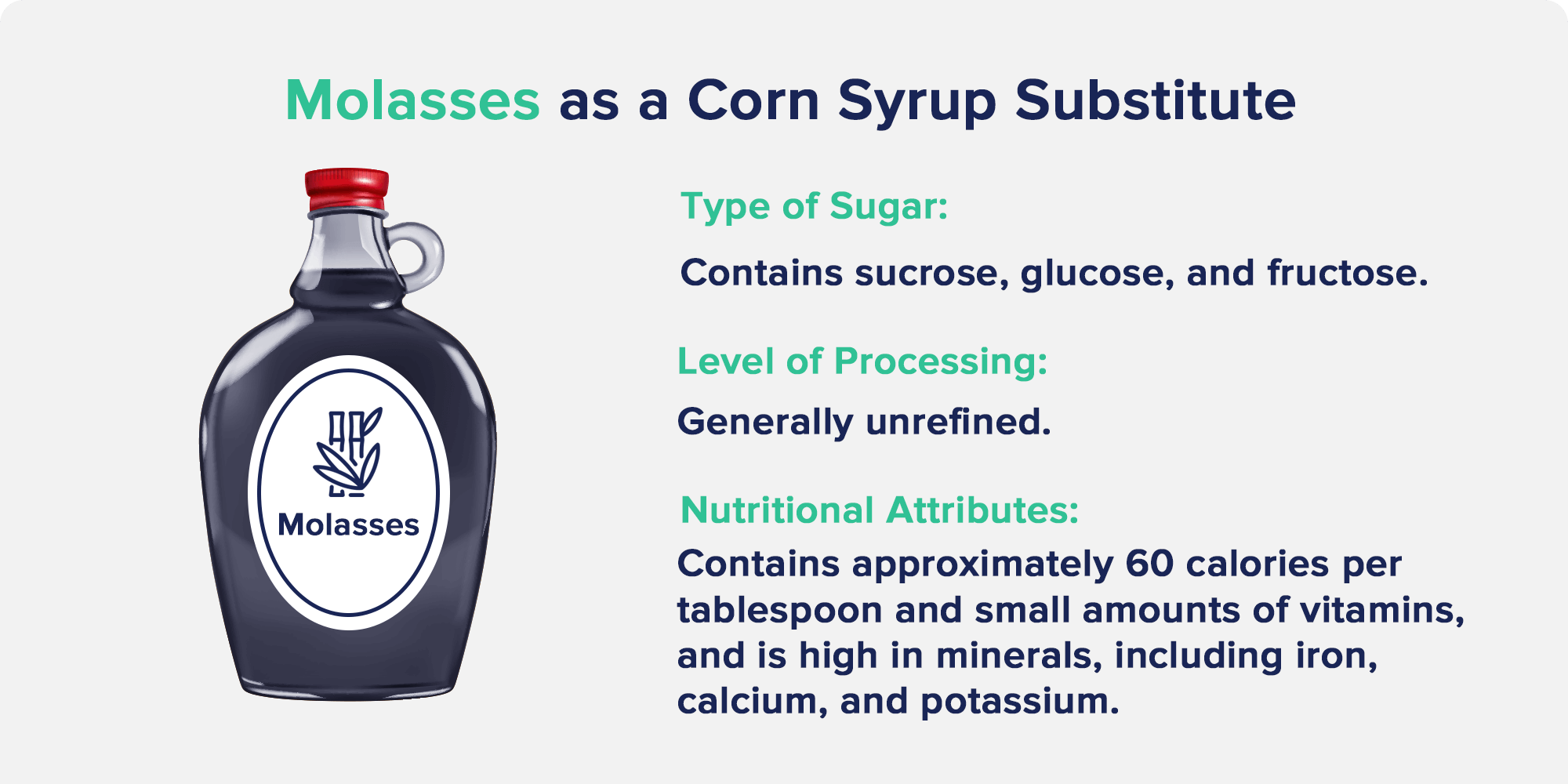
Depending on your application, it’s typically recommended for flavor purposes that you only swap out molasses for dark corn syrup.
Still, the texture of molasses lends itself nicely to swap in corn syrup of any kind in the case of sauces, glazing, and many baked dishes. You can use a simple 1:1 ratio when substituting in molasses, by the way, or you can combine molasses and dark corn syrup.
Some forms of molasses (like blackstrap) can be produced as byproducts in the sugarcane refining process, but it is a naturally occurring sugar that is less refined than corn syrup.
Nutritionally, molasses puts the hurt on corn syrup up and down the label, offering more manganese, magnesium, iron, B vitamins, potassium, and calcium.
Whether or not this particular corn syrup substitute inspires a genteel southern accent while you’re using it is up to you, but it does make it more fun, we do declare.
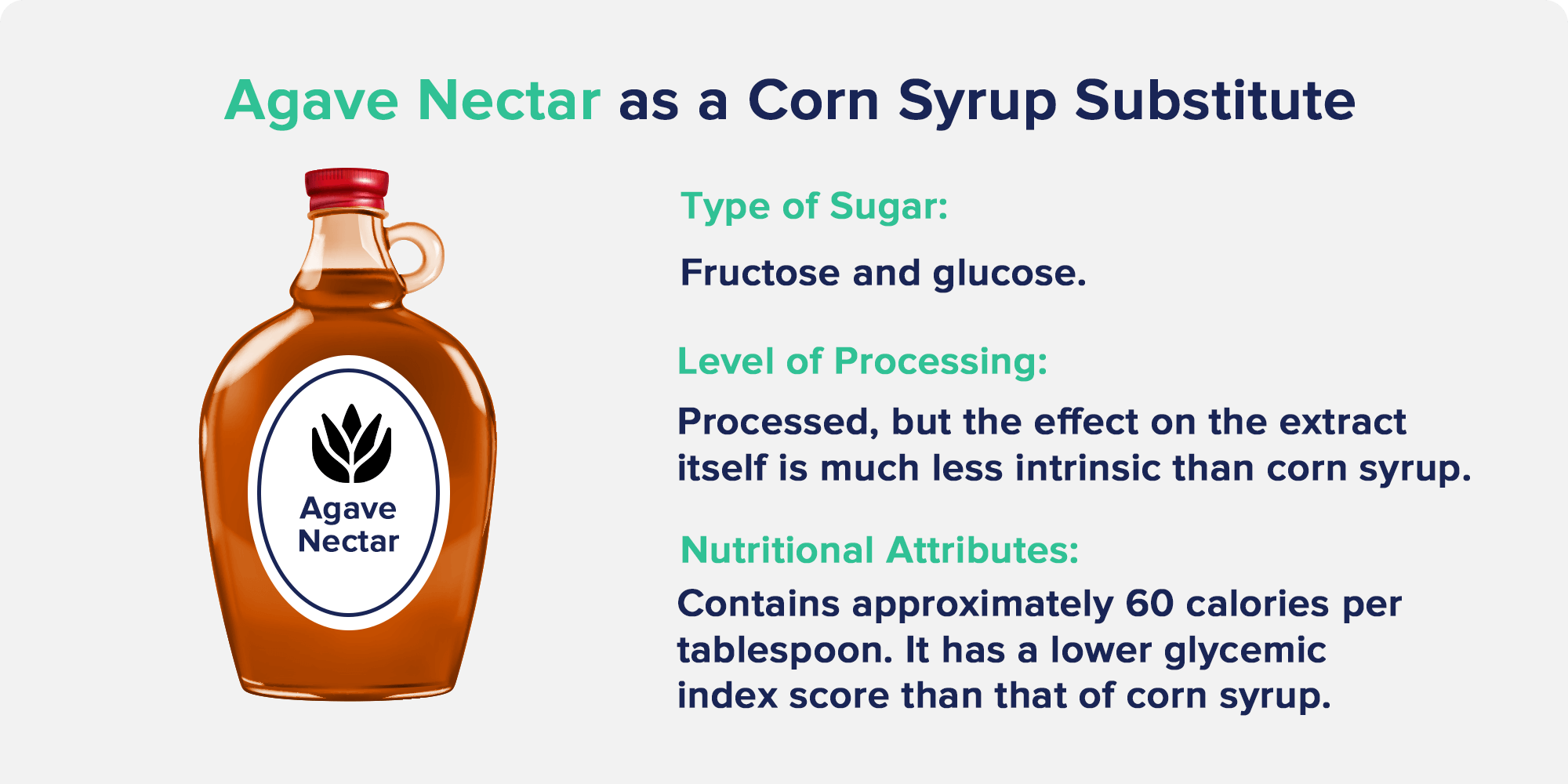
Though agave nectar does contain some fructose, the naturally occurring ratio of fructose to glucose from agave extracts still results in a lower glycemic index score than that of corn syrup.
Speaking of naturally occurring, agave also wins when it comes to processing.
Granted, a chemical solvent/extraction process is still required to get the nectar out, but the effect on the extract itself is much less intrinsic than corn syrup, which is chemically altered to increase sweetness.
Agave is also a great substitute for vegans, who can’t have honey.
Like all added sweeteners, agave nectar should be consumed in moderation, but many people prefer it as a more natural, but still tasty sweetener with slightly better health implications.
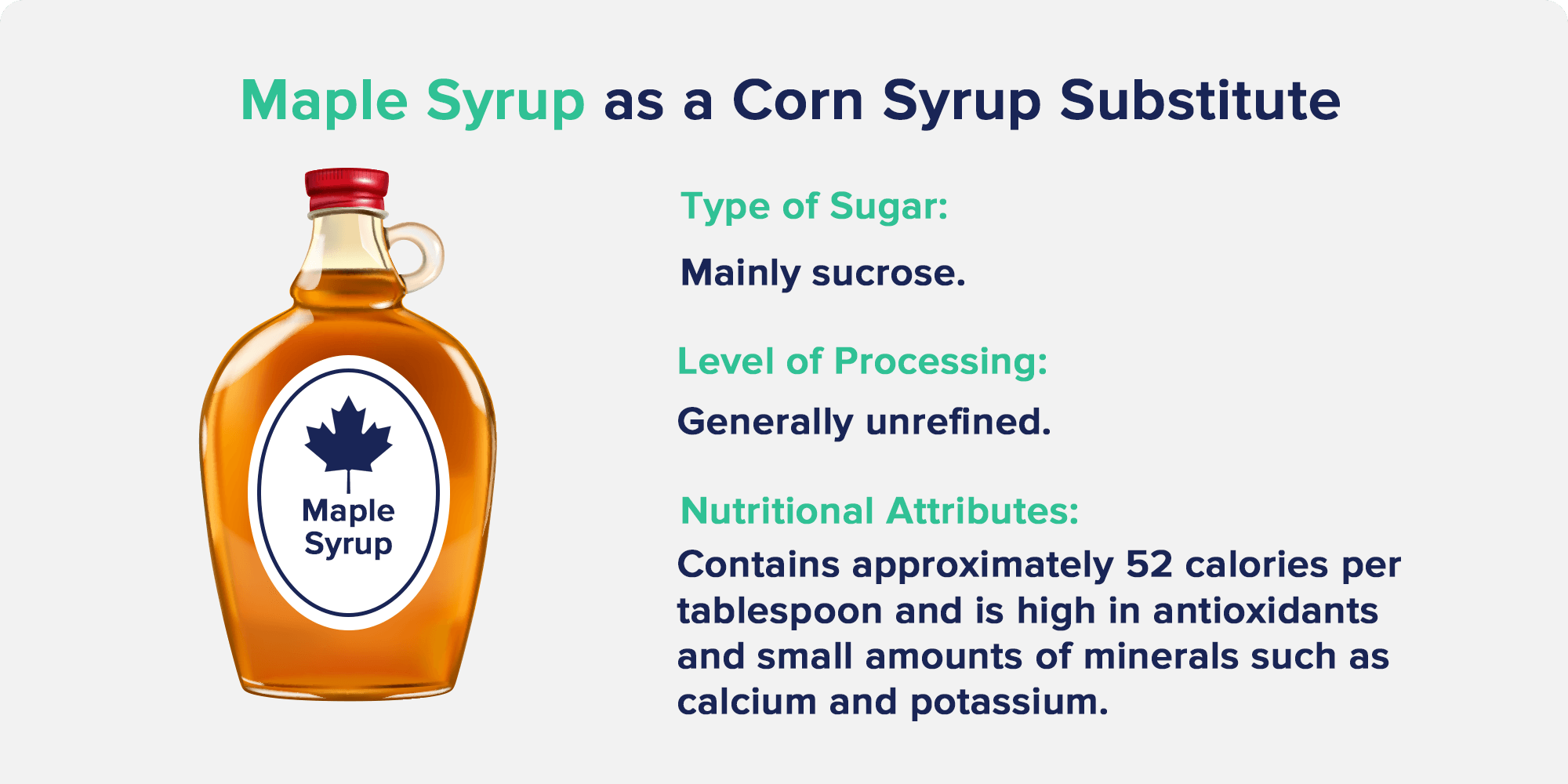
Like honey, maple syrup can crystallize, which is an issue for some recipes.
However, also like honey, maple syrup contains antioxidants like benzoic acid, gallic acid, quercetin, and more.
The low-glycemic theme keeps going strong in the case of maple syrup also; it won’t spike your blood glucose levels as dramatically as refined corn syrup.
It seems strange, but even when the amount of certain antibiotics was reduced by 90%, pairing them with maple syrup extracts was found to create as strong of an antimicrobial effect in this study.
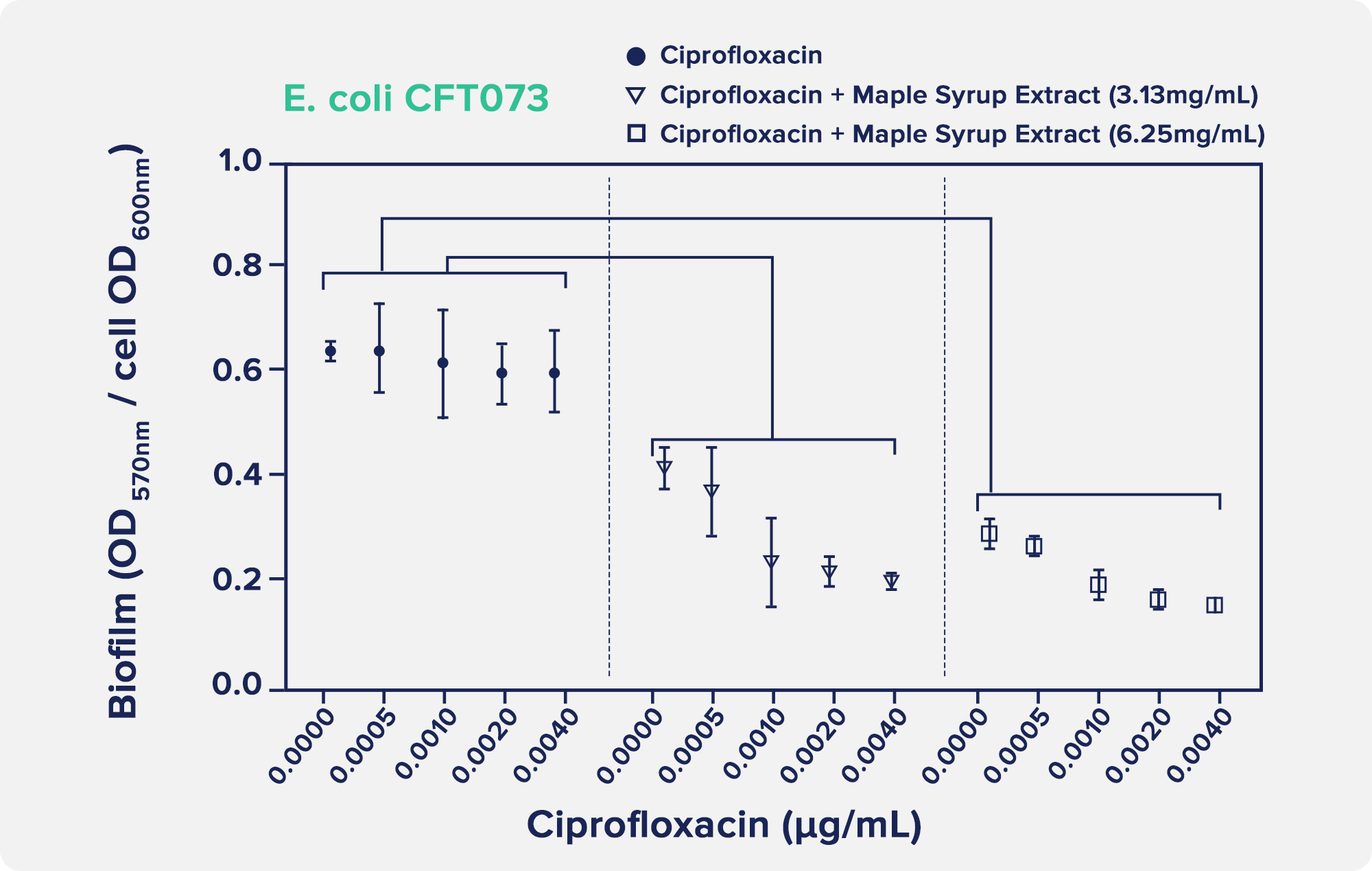
Of course, this in no way gives you license to start chugging maple syrup like a native Quebecer; it’s still a form of sugar to be used sparingly.
In more practical terms, maple syrup can be subbed in for corn syrup in the same manner as molasses—exchange it on a 1:1 basis for dark corn syrup.
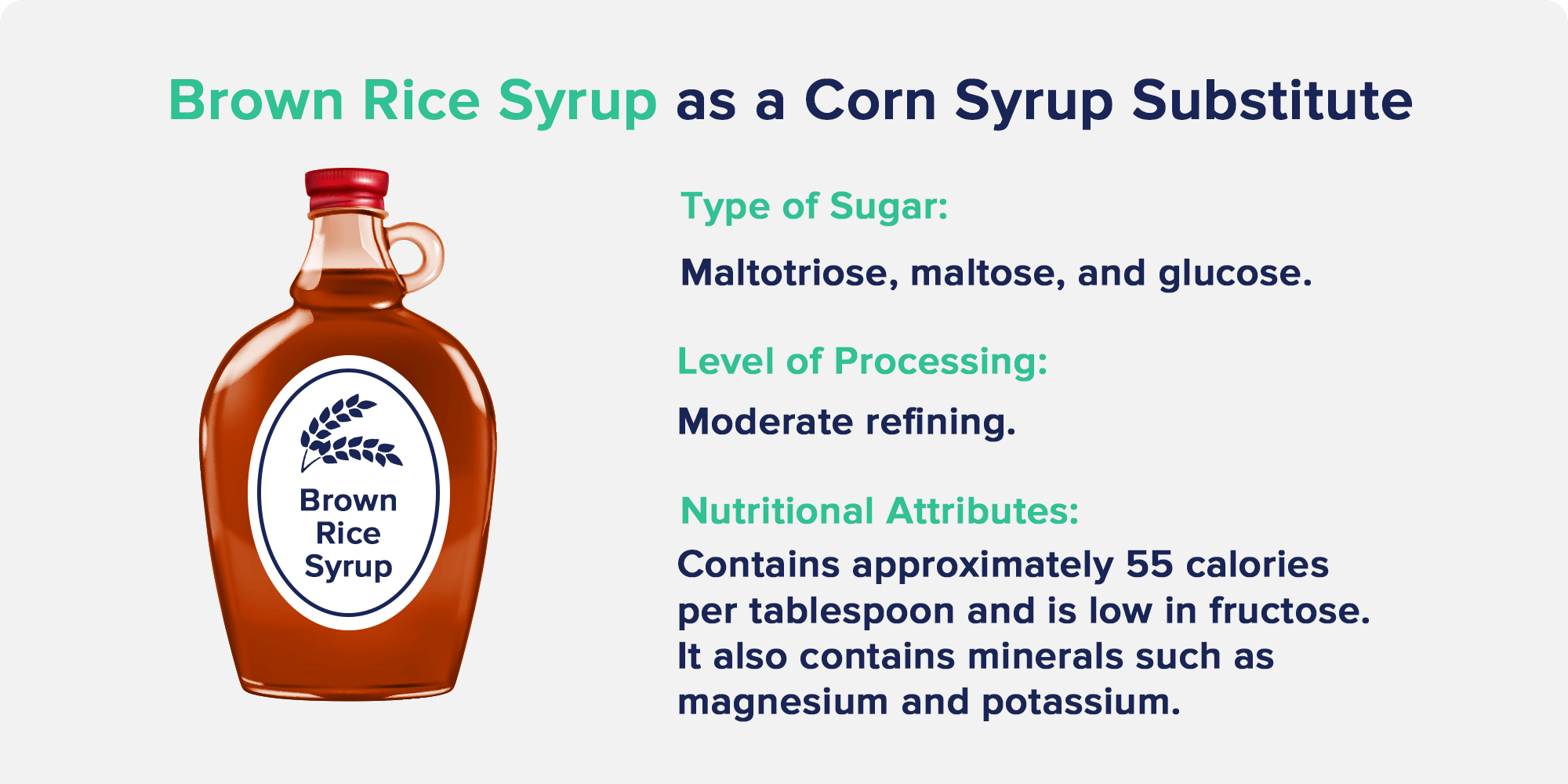
It’s a bit lower in calories and slightly different in taste, but otherwise, brown rice syrup is considered by many to be interchangeable with corn syrup.
All three forms of sugar (maltotriose, maltose, and glucose) in brown rice syrup are a form of glucose, with no fructose whatsoever.
This means that the digestibility of brown rice syrup—as well as the effect on the liver—is not dramatically different than that of corn syrup, though much better than high-fructose corn syrup.
Heavy metal contamination in brown rice is a thing, which is why we always recommend sourcing your brown rice syrup (or just the rice itself, for that matter) from high-quality brands that confirm negligible amounts of heavy metals with testing. GoMacro is a great example.
Speaking of those cold-pressed bars we’re a bit hooked on, GoMacro provides an example of another application of brown rice: holding ingredients together with its stickiness so you don’t have to bake.
The above options are just a sampling of some of the most popular options for replacing corn syrup in all kinds of baked goods and other dishes.
Your nutritional needs, tastes, and the dish(es) you intend to use the substitute in can all affect which corn syrup substitute is best for you.
In most cases, cane sugar will stand in for corn syrup with little noticeable difference in flavor, though some applications may call for syrup due to reasons related to texture, chemistry, etc.
Opinions vary based on the context, but generally, cane sugar and corn syrup are said to be close to equal in their nutritional value.
If the recipe didn’t call for much corn syrup in the first place, and if we’re indeed talking about regular (and not high-fructose) corn syrup, you may be able to get by with little to no substitution.
This depends on your preference; the lack of sweetness will probably be noticeable even if the amount of corn syrup called for was low.
As always, you can use a substitute, even in small amounts, to cover some of the flavor gap.
High-fructose corn syrup is atrociously bad for your health (shocker). Avoid it at all costs.
Pure corn syrup (no fructose at all), while a considerably more reasonable choice, still presents an opportunity for nutritionally superior substitutions.
Those substitutions include maple syrup, honey, and molasses, to name just a few.
No matter how healthy your corn syrup substitute is, it’s still a form of sugar. Always consume in moderation.